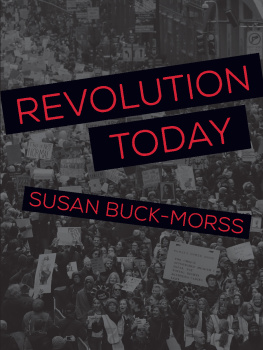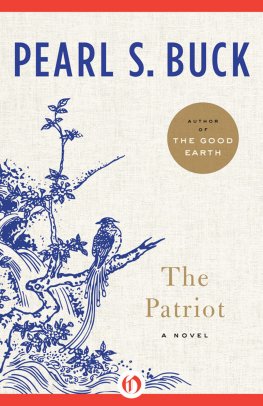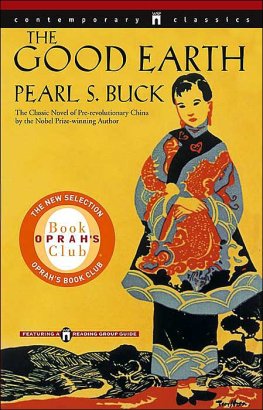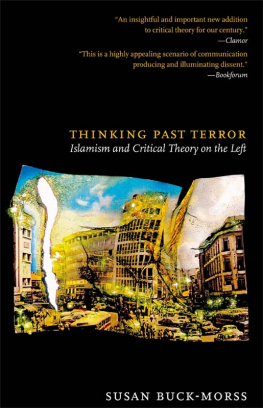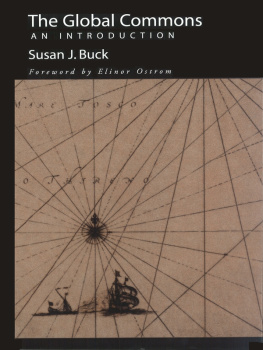Buck-Morss Susan - Revolution Today
Here you can read online Buck-Morss Susan - Revolution Today full text of the book (entire story) in english for free. Download pdf and epub, get meaning, cover and reviews about this ebook. publisher: Lightning Source Inc. (Tier 3), genre: Politics. Description of the work, (preface) as well as reviews are available. Best literature library LitArk.com created for fans of good reading and offers a wide selection of genres:
Romance novel
Science fiction
Adventure
Detective
Science
History
Home and family
Prose
Art
Politics
Computer
Non-fiction
Religion
Business
Children
Humor
Choose a favorite category and find really read worthwhile books. Enjoy immersion in the world of imagination, feel the emotions of the characters or learn something new for yourself, make an fascinating discovery.
- Book:Revolution Today
- Author:
- Publisher:Lightning Source Inc. (Tier 3)
- Genre:
- Rating:5 / 5
- Favourites:Add to favourites
- Your mark:
- 100
- 1
- 2
- 3
- 4
- 5
Revolution Today: summary, description and annotation
We offer to read an annotation, description, summary or preface (depends on what the author of the book "Revolution Today" wrote himself). If you haven't found the necessary information about the book — write in the comments, we will try to find it.
Revolution Today — read online for free the complete book (whole text) full work
Below is the text of the book, divided by pages. System saving the place of the last page read, allows you to conveniently read the book "Revolution Today" online for free, without having to search again every time where you left off. Put a bookmark, and you can go to the page where you finished reading at any time.
Font size:
Interval:
Bookmark:
Praise for Revolution Today
Susan Buck-Morss in Revolution Today offers people across the globe a newer way of seeing, knowing, acting, and naming their political engagements. She uses extraordinary images to assist us in articulating newly robust revolutionary imaginings. As always, Susan finds history in the present without its limitations. Its a stunning read for these urgent times.
Zillah Eisenstein, writer, activist, and professor emerita of anti-racist feminist theory, Ithaca College
REVOLUTION TODAY
Susan Buck-Morss
Praise for Susan Buck-Morss
Susan Buck-Morss is a researcher who scrutinizes the porous boundaries of the systems of meanings and looks for cracks in the seemingly cohesive modern narration on freedom, emancipation, and humanity. She reaches beyond the specialized languages of individual disciplines, on which she draws and which she mixes, and intently observes visual culture.
Political Critique
RE VOLUTION TODAY
Susan Buck-Morss

2019 Susan Buck-Morss
Published in 2019 by
Haymarket Books
P.O. Box 180165
Chicago, IL 6618
773-583-7884
www.haymarketbooks.org
ISBN: 978-1-64259-171-2
Distributed to the trade in the US through Consortium Book Sales and Distribution (www.cbsd.com) and internationally through Ingram Publisher Services International (www.ingramcontent.com).
This book was published with the generous support of
Lannan Foundation and Wallace Action Fund.
Cover design by Rachel Cohen.
Interior design by Eric Kerl.
Library of Congress Cataloging-in-Publication data is available.

Introduction
The year 201718 marked a confluence of political anniversaries. It was the centennial of the October 1917 revolution that brought the Bolsheviks to power in Russia. It was the fiftieth anniversary of May 68, the Paris student/workers revolt that had iterations throughout the world. Marxs Capital, volume 1, was 150 years old. And Marx himself turned 200 in May 2018. Conferences were convened globally to reflect on the question: What has become of the left revolutionary project? For most of the twentieth century, Marxism served as the common political language of the left. In every nation, his critical texts were translated, read, debated, and practiced. Revolutionary movements in Marxs name were multiple. From China to Cuba they achieved success. Marxist networks were a serious challenge to the territorial organization of nation states. International solidarity among revolutionaries threatened to topple state regimes around the world.
Today, on the surface of things, nothing could seem less likely. Capitalism has morphed into a global system of interdependency that overpowers nation states. Populations are pressured into compliance with capitals iron laws. Right-wing populism is on the rise. Neoliberals boast of global hegemony. Individuals are incorporated directly into the capitalist logic of competition, self-promotion, and profit-maximizing that appears both desirable and inevitable. Ironically, the government of China, which claims a monopoly over Marxs legacy, is rising precipitously under conditions of global capitalism, a trajectory that shows no signs of directional change.
The mood on the left fluctuates, toggling between triumph and despair. The critical analysis of the systemic nature of capitalism has never seemed more accurate. Yet, the emergence of a revolutionary subject is not to be found in classical Marxist terms. Left-wing melancholia is on the rise, as is fear of fascisms resurgence. But something crucial is missing from this pessimistic evaluation. Outside the traditional Marxist frame, mobilizations of opposition are not only happening, they are also gaining support, and developing a global consciousness in the process. This is a cause for hope. The fact that the new social movements do not fit the expected left-course of history is not reason for dismissing themjust the opposite, as empirical history shows us that the expected course was wrong. In our time, new political subjects are emerging. This book celebrates their birth.
A celebration requires gifts. This book is a small one. It does not approach a comprehensive theoretical overview or a compendium of political history. It does not take up the ongoing debates that dominate the academic discussion. It is a more personal contribution, based on lived experiences. And for my life, the decentering, multifocal processes of globalization have been as determining as they were unexpected. The trans-local connections generated by globalization have transformed the content of reflection and revolutionized its mediated forms. Recorded here are reflections on small fragments of recent history, the ones that I happen to know. I try to read these fragments through the images they produce and the global messages they contain. Many are credited to leftist organizations whose work is exemplary. They remind us of the potential for global action that already exists and how much of the new revolutionary vernacular we share.
This book emerged out of a series of presentations during the year of revolutionary anniversaries. Material was added each time to address the particular situation: Buenos Aires; London; Moscow; St. Petersburg; So Paulo; Athens; New York City; Middlebury, Vermont.
The particular contexts produced discussions that exposed the limits of my perspective. They underlined the fact that theory is always local, and perceptions of reality are patchy at best. But they also convinced me that the underlying contradiction between nation-state politics and global capitalism is fundamental to our local situations, so that focusing on it can provide a point of convergence. The new subjectivities occupy this point.
I am indebted to the people who organized the meetings I attended during the 20172018 anniversary year. Their work and the contributions of other participants shape my thinking and inspire my hope: Mariano Lpez Seoane, NYU Buenos Aires and Daniel Link, Universidad Nacional de Tres de Febrero, organizers of the international conference Pasado de Revoluciones in Buenos Aires; Matthew Walker and the Clifford Symposium, The Soviet Century: 100 Years of Revolution at Middlebury College; Jodi Dean, Artemy Magun, Alexei Penzin, and Oxana Timofeva, hosts of the international conference, 19172017: Revolutions, Communist Legacies and Spectres of the Future at the European University of St. Petersburg; Judith Butler of the International Consortium of Critical Theory and Vladimir Pinheiro Safatle, Universidade de Sa Paulo, conveners of the conference The Ends of Democracy: Populist Strategies, Skepticism about Democracy and the Quest for Popular Sovereignty in Sa Paulo; Katherine Carl, curator, and James Sevitt for the series Reckoning with the Crisis of Imagination at the St. James Gallery, CUNY Graduate Center; and lecture invitations from Aya ubuku at the London School of Economics, Yiannis Mylonas at the National Research University Higher School of Economics, Moscow, and Costas Douzinas, member of the Hellenic Parliament in Athens. Thanks as well for the critical feedback provided by my ongoing collective at the CUNY Graduate Center in New York City, the Committee on Globalization and Social Change, directed by Gary Wilder. They are an amazing group of collaborators.
Working with Haymarket has been a pleasure. Thanks to Nisha Bolsey, Anthony Arnove, Caroline Luft, Eric Kerl, and Rachel Cohen. And a final thanks to Zachary Conn, CUNY Graduate Center, for his invaluable assistance with the images.
Next pageFont size:
Interval:
Bookmark:
Similar books «Revolution Today»
Look at similar books to Revolution Today. We have selected literature similar in name and meaning in the hope of providing readers with more options to find new, interesting, not yet read works.
Discussion, reviews of the book Revolution Today and just readers' own opinions. Leave your comments, write what you think about the work, its meaning or the main characters. Specify what exactly you liked and what you didn't like, and why you think so.

